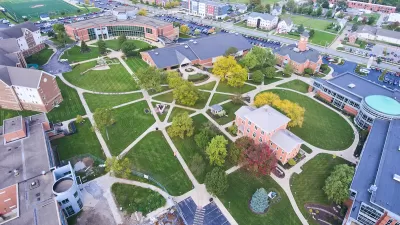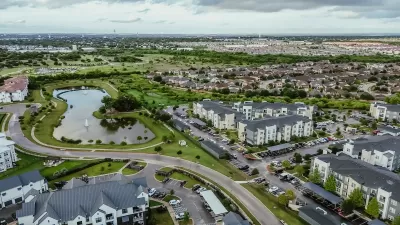Major employers and economic drivers like universities can use various tools to make housing more affordable for their students and staff.

In a piece for Smart Cities Dive, Eric Maribojoc describes how ‘anchor institutions’ such as universities can help alleviate the housing crisis faced by many cities.
Maribojoc outlines how some colleges and universities have launched programs aimed at supporting affordable housing for their employees and communities. According to Maribojoc, “Their interventions are not only effective for their communities, but also fiscally responsible investments with steady returns.”
The University of Virginia leased two plots of land to developers for new housing, while “Durham Technical Community College, in North Carolina, is contributing a 10-acre location to a partnership with the Bank of America, Mosaic Development Group, and the Partnership for Southern Equity to build housing with a preference for their students.”
Some schools that don’t own underutilized land are subsidizing housing grants for their staff, while others are helping students experiencing housing insecurity access housing services.
Maribojoc adds, “While it may seem like a risky investment, our research found that institutions that provide funds for lending to affordable housing see steady returns of between 2% to 3% a year.”
FULL STORY: Colleges can take steps to address the affordable housing crisis

Alabama: Trump Terminates Settlements for Black Communities Harmed By Raw Sewage
Trump deemed the landmark civil rights agreement “illegal DEI and environmental justice policy.”

Planetizen Federal Action Tracker
A weekly monitor of how Trump’s orders and actions are impacting planners and planning in America.

Why Should We Subsidize Public Transportation?
Many public transit agencies face financial stress due to rising costs, declining fare revenue, and declining subsidies. Transit advocates must provide a strong business case for increasing public transit funding.

Understanding Road Diets
An explainer from Momentum highlights the advantages of reducing vehicle lanes in favor of more bike, transit, and pedestrian infrastructure.

New California Law Regulates Warehouse Pollution
A new law tightens building and emissions regulations for large distribution warehouses to mitigate air pollution and traffic in surrounding communities.

Phoenix Announces Opening Date for Light Rail Extension
The South Central extension will connect South Phoenix to downtown and other major hubs starting on June 7.
Urban Design for Planners 1: Software Tools
This six-course series explores essential urban design concepts using open source software and equips planners with the tools they need to participate fully in the urban design process.
Planning for Universal Design
Learn the tools for implementing Universal Design in planning regulations.
Caltrans
Smith Gee Studio
Institute for Housing and Urban Development Studies (IHS)
City of Grandview
Harvard GSD Executive Education
Toledo-Lucas County Plan Commissions
Salt Lake City
NYU Wagner Graduate School of Public Service





























